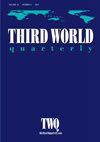Does regionalism increase industrial policy space? An analytical framework applied to the East African textiles and apparel sector
IF 1.8
2区 经济学
Q2 DEVELOPMENT STUDIES
引用次数: 0
Abstract
Abstract We introduce a multidimensional and multilevel framework for industrial policy space as the set of legally permitted, economically viable and politico-institutionally feasible policy options for industrial development, given constraints at the national, regional and global levels. This is applied to the East African Community (EAC) textiles and apparel (T&A) sector, using data from policy documents and semi-structured interviews. The EAC customs union nominally transfers trade policy sovereignty to the regional level, but we present evidence showing how the duty remission scheme allows governments to provide targeted trade policy rents to domestic T&A firms, maintaining national legal policy space. This comes at a cost, because firms benefiting from national duty remission rents may not sell their goods duty free in other EAC countries, so the expanded economic policy space offered by regional integration is curtailed. In the political-institutional sphere, the EAC allowed a new policy option to emerge at the regional level – import substitution of used clothes – but global-level policy space constraints prevented implementation when US authorities threatened to remove trade preferences underpinning thousands of jobs. Regional integration policies should take into account tensions between different dimensions and levels of industrial policy space to maximise prospects for sustainable development.区域主义是否增加了产业政策空间?适用于东非纺织和服装部门的分析框架
摘要我们引入了一个多层面和多层次的产业政策空间框架,作为一套法律允许、经济可行和政治制度可行的产业发展政策选择,考虑到国家、区域和全球层面的限制。这适用于东非共同体(EAC)纺织和服装(T&A)部门,使用来自政策文件和半结构化访谈的数据。东非共同体关税同盟名义上将贸易政策主权转移到地区层面,但我们提供的证据表明,关税减免计划如何允许政府向国内T&A公司提供有针对性的贸易政策租金,从而保持国家法律政策空间。这是有代价的,因为受益于国家关税减免租金的公司可能不会在其他东非共同体国家免税销售商品,因此区域一体化提供的扩大的经济政策空间受到了限制。在政治制度领域,东非共同体允许在地区层面出现一种新的政策选择——进口旧衣服——但当美国当局威胁要取消支撑数千个工作岗位的贸易优惠时,全球层面的政策空间限制阻止了实施。区域一体化政策应考虑到不同层面和水平的产业政策空间之间的紧张关系,以最大限度地提高可持续发展的前景。
本文章由计算机程序翻译,如有差异,请以英文原文为准。
求助全文
约1分钟内获得全文
求助全文
来源期刊

Third World Quarterly
DEVELOPMENT STUDIES-
CiteScore
4.10
自引率
15.00%
发文量
137
期刊介绍:
Third World Quarterly ( TWQ ) is the leading journal of scholarship and policy in the field of international studies. For almost four decades it has set the agenda of the global debate on development discourses. As the most influential academic journal covering the emerging worlds, TWQ is at the forefront of analysis and commentary on fundamental issues of global concern. TWQ examines all the issues that affect the many Third Worlds and is not averse to publishing provocative and exploratory articles, especially if they have the merit of opening up emerging areas of research that have not been given sufficient attention. TWQ is a peer-reviewed journal that looks beyond strict "development studies", providing an alternative and over-arching reflective analysis of micro-economic and grassroot efforts of development practitioners and planners. It furnishes expert insight into crucial issues before they impinge upon global media attention. TWQ acts as an almanac linking the academic terrains of the various contemporary area studies - African, Asian, Latin American and Middle Eastern - in an interdisciplinary manner with the publication of informative, innovative and investigative articles. Contributions are rigorously assessed by regional experts.
 求助内容:
求助内容: 应助结果提醒方式:
应助结果提醒方式:


